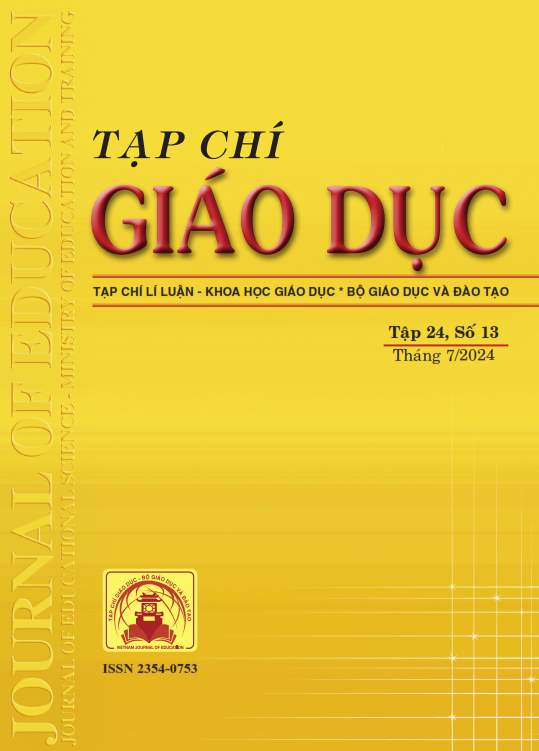Giới thiệu công cụ đánh giá kĩ năng ngữ dụng của trẻ em: hồ sơ ngữ dụng trong kĩ năng giao tiếp hằng ngày
Tóm tắt
Pragmatics is one of the essential components of language. Pragmatics refers to the appropriate and effective use of language in a specific context. It is the content in the assessment and intervention for children with special needs. However, pragmatics has not received as much research attention as other language areas such as phonetics, semantics, and grammar. The article briefly introduces the tool “The Pragmatics Profile of Everyday Communication Skills” based on the results of comprehensive descriptive research and document analysis of international scientific articles. The research results show that the “Pragmatics Profile” has been used to assess pragmatics in preschool children with typical development and children with special needs (CSN). At the same time, measures to verify the reliability of pragmatic profiles when applied to normal preschool children and CSN in languages around the world are also discussed. The article draws some lessons from the experience and recommends using “The Pragmatics Profile of Everyday Communication Skills” to examine normal preschool children and CSN in Vietnam.
Tài liệu tham khảo
Brand, D., Zaidman-Zait, A., & Most, T. (2018). Parent couples’ coping resources and involvement in their children’s intervention program. Journal of Deaf Studies and Deaf Education, 23(3), 189-199. https://doi.org/10.1093/deafed/eny011
Crowe, K., & Dammeyer, J. (2021). A review of the conversational pragmatic skills of children with cochlear implants. Journal of Deaf Studies and Deaf Education, 26(2), 171-186. https://doi.org/10.1093/deafed/enab001
Dewart, H., & Summers, S. (1995). The pragmatics profile of everyday communication skills in children. Nfer-Nelson.
Dey, I. (1993). Qualitative Data Analysis: A user friendly guide for social scientists. London: Routledge.
Đỗ Hữu Châu (2007). Giáo trình Giản yếu về ngữ dụng học. NXB Đại học Huế.
Gleason, J. B. (2005). The development of language. Boston, MA: Pearson.
Ketelaars, M. P., Cuperus, J., Jansonius, K., & Verhoeven, L. (2010). Pragmatic language impairment and associated behavioural problems. International Journal of Language & Communication Disorders, 45(2), 204-214.
Kirchner, D. M., & Prutting, C. A. (1987). Spontaneous verbal repetition: A performance-based strategy for language acquisition. Clinical Linguistics & Phonetics, 1(2), 147-169.
Liêu Thị Thanh Nhàn, Trần Văn Tư, Nguyễn Anh Thành, Nguyễn Thị Thanh Xuân (2023). Truyện cười Việt Nam dưới góc nhìn ngữ dụng học. Kỉ yếu hội thảo khoa học: Nghiên cứu, đào tạo Việt Nam học theo định hướng liên ngành, 726-738. NXB Đại học Quốc gia Hà Nội.
Meraji, S. M., & Sadighi, F. (2013). Relationship between reading short stories and the writing proficiency of Iranian EFL learners. International Journal of Language Learning and Applied Linguistics World, 3(4), 134-144.
Mouvet, K., Matthijs, L., Loots, G., Taverniers, M., & Van Herreweghe, M. (2013). The language development of a deaf child with a cochlear implant. Language Sciences, 35, 59-79. https://doi.org/10.1016/j.langsci.2012.05.002
Ninio, A., & Snow, C. E. (1998). The development of pragmatics: Learning to use language appropriately. In Handbook of child language acquisition (pp. 347-383). Brill.
Parsons, L., Cordier, R., Munro, N., Joosten, A., & Speyer, R. (2017). A systematic review of pragmatic language interventions for children with autism spectrum disorder. PloS One, 12(4), e0172242. https://doi.org/10.1371/journal.pone.0172242
Roberts, J., Williams, K., Carter, M., Evans, D. L., Parmenter, T. R., Silove, N., Clark, T., & Warren, A. (2011). A randomised controlled trial of two early intervention programs for young children with autism: Centre-based with parent program and home-based. Research in Autism Spectrum Disorders, 5(4), 1553-1566. https://doi.org/10.1016/j.rasd.2011.03.001
Robson, C. (1993). Real World Research: A Resource for Social Scientists and Practitioner Researchers. Oxford: Blackwell.
Stojanovik, V., & James, D. (2006). Short‐term longitudinal study of a child with Williams syndrome. International Journal of Language & Communication Disorders, 41(2), 213-223.
Whitehouse, A. J. O., Watt, H., Line, E., & Bishop, D. V. M. (2009). Adult psychosocial outcomes of children with specific language impairment, pragmatic language impairment and autism. International Journal of Language and Communication Disorders, 44(4), 511-528. https://doi.org/10.1080/13682820802708098
Tải xuống
Đã Xuất bản
Cách trích dẫn
Số
Chuyên mục
Giấy phép

Tác phẩm này được cấp phép theo Ghi nhận tác giả của Creative Commons Giấy phép quốc tế 4.0 .












